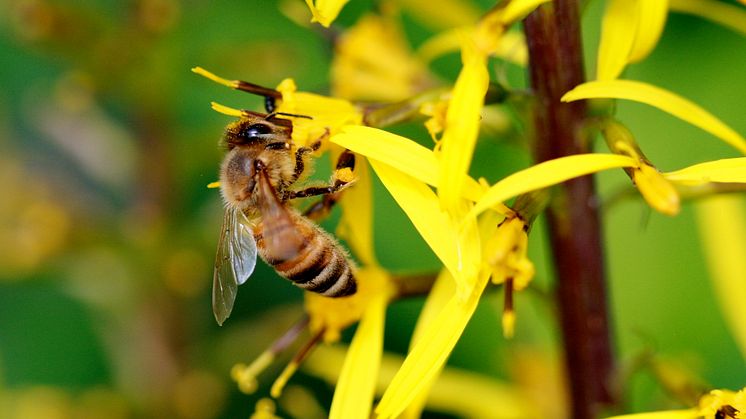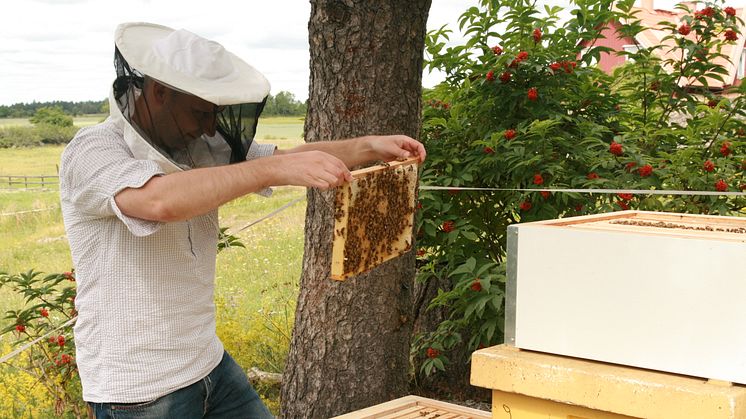Press release -
Evolutionary history of honeybees revealed by genomics
In a study published in Nature Genetics, researchers from Uppsala University present the first global analysis of genome variation in honeybees. The findings show a surprisingly high level of genetic diversity in honeybees, and indicate that the species most probably originates from Asia, and not from Africa as previously thought.
The honeybee (Apis mellifera) is of crucial importance for humanity. One third of our food is dependent on the pollination of fruits, nuts and vegetables by bees and other insects. Extensive losses of honeybee colonies in recent years are a major cause for concern. Honeybees face threats from disease, climate change, and management practices. To combat these threats it is important to understand the evolutionary history of honeybees and how they are adapted to different environments across the world.
“We have used state-of-the-art high-throughput genomics to address these questions, and have identified high levels of genetic diversity in honeybees. In contrast to other domestic species, management of honeybees seems to have increased levels of genetic variation by mixing bees from different parts of the world. The findings may also indicate that high levels of inbreeding are not a major cause of global colony losses”, says Matthew Webster, researcher at the department of Medical Biochemistry and Microbiology, Uppsala University.
Another unexpected result was that honeybees seem to be derived from an ancient lineage of cavity-nesting bees that arrived from Asia around 300,000 years ago and rapidly spread across Europe and Africa. This stands in contrast to previous research that suggests that honeybees originate from Africa.
“The evolutionary tree we constructed from genome sequences does not support an origin in Africa, this gives us new insight into how honeybees spread and became adapted to habitats across the world”, says Matthew Webster.
Hidden in the patterns of genome variation are signals that indicate large cyclical fluctuations in population size that mirror historical patterns of glaciation. This indicates that climate change has strongly impacted honeybee populations historically.
“Populations in Europe appear to have contracted during ice ages whereas African populations have expanded at those times, suggesting that environmental conditions there were more favourable”, says Matthew Webster.
The researchers also identified specific mutations in genes important in adaptation to factors such as climate and pathogens, including those involved in morphology, behaviour and innate immunity.
“The study provides new insights into evolution and genetic adaptation, and establishes a framework for investigating the biological mechanisms behind disease resistance and adaptation to climate, knowledge that could be vital for protecting honeybees in a rapidly changing world”, says Matthew Webster.
Wallberg et al. (2014) “A worldwide survey of genome sequence variation provides insight into the evolutionary history of the honeybee Apis mellifera, Nature Genetics, DOI: 10.1038/NG.3077
For more information, contact Matthew Webster, phone: +46 18 471 43 91, mobile: +46 70 615 96 59, e-mail: matthew.webster@imbim.uu.se
Science for Life Laboratory (SciLifeLab) is a centre for molecular biosciences with the focus on health and environmental research. The centre combines advanced technical know-how and state-of-the art equipment with a broad knowledge of translational medicine and molecular bioscience. SciLifeLab is a national resource and a collaboration between four universities: Karolinska Institutet, KTH Royal Institute of Technology, Stockholm University and Uppsala University.
Topics
Uppsala University -- quality, knowledge, and creativity since 1477
World-class research and outstanding education of global benefit to society, business, and culture.
Uppsala University is one of northern Europe's highest ranked academic institutions. www.uu.se


